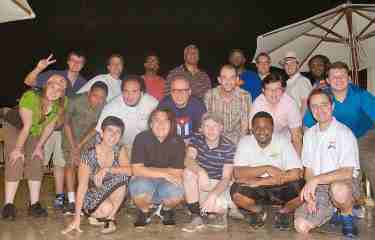
by Kelly Rogge
The Kansas City Kansas Community College Jazz Band has been back in the United States for almost one month, but they are still talking about their adventure in Havana, Cuba.
“The trip exceeded our expectations in every regard. It was like stepping into a time warp, but at the same time the music was flawless, the people were loving and have a great work ethic but also take the time to relax,” said Jim Mair, director of the KCKCC Jazz Band. “The college band played beautifully with people dancing in the aisles and giving standing ovations. People would see us on the street days later and tell us how much they loved the concerts.”
The jazz ensemble performed at the 2014 Havana International Jazz Festival Dec. 16-22. The invitation was based on the group’s long reputation as one of the premiere community college jazz ensembles in the nation. The group included 23 musicians and 21 community members.
The jazz festival started in 1978 when Bobby Carcasses and other Cuban jazz musicians had a concert at the Case de la Cultura de Plaza. The following year, Chucho Valdes, now the president of the festival’s organizing committee, gave another concert. Those yearly concerts morphed into the festival as it is known today.
“I think everyone had a different portion of the trip that was memorable,” Mair said. “For me, it was the KC style jam session we created on our last concert by inviting the Cuban and Norwegian musicians to play in our band and to solo with our students.”
But what the KCKCC group did not know was that a major shift in U.S.-Cuban relations would take place while they were in Havana.
President Barack Obama started the process of restoring full diplomatic relations with the communist country just days into the group’s trip. This included the release of three Cubans in an American prison and the release of one American in Cuba.
“It was phenomenal,” said Mair on being in Cuba during the announcement. “We were gathering around a snowy TV screen at a local merchants shop with the store owner holding up an antenna trying to get a good signal to hear the announcement. Some people I spoke with hoped for a hybrid of the Cuban system – a hybrid of socialism and capitalism much like Canada and what President Obama is attempting to do with the United States.”
Mair said there are some stark differences between the United States and Cuba. He said the small country is behind in the regards to infrastructure, and there is an obvious lack of goods and services.
However, Cuba also has a 100 percent literacy rate and a very high graduation rate from high school. Many Cubans have college degrees and both education and health care are free.
“Tipping is an important part of the culture. You tip for almost everything. Almost every meal was beans and rice with chicken or fish. The food is not spicy. The breakfast buffet was reminiscent of a casino or cruise ship. They had everything,” he said. “The professional musicians are much further ahead than us.
“They never make mistakes. Flawless execution with their voices, wind instruments and percussion. Being self-employed and an entrepreneur is very big in Cuba. Your house can serve as a restaurant, bed and breakfast, art gallery, gift shop or anything that show cases your talents.”
In addition to attending the festival, the jazz ensemble had the opportunity to take a guided tour of the UNESCO World Heritage Site and the Havana Historical Centre; tour Cuba’s National Museum of Fine Arts; visit the Institute Superior de Arte, the country’s top art academy; explore Finca Vigia, where Ernest Hemingway lived for more than 20 years; enjoy tap dancing and live jazz music at Pena de Santa Amalia and learn about the Cuban culture.
“I was blown away by the dance concert we attended,” said Rayvon Haggerty, a saxophonist in the group who had never been on an airplane before. “It combined the use of ceiling and floor cameras projected on the back wall of the stage of the dancers dancing. They combined the projections with the dancing so they were actually dancing with themselves. It was jaw dropping.”
Mair said the jazz ensemble’s performances were well received.
“We stuck to Kansas City swing music and Americana music as opposed to playing anything in a Latin vein.
“People were stopping our students on the streets and in market areas to say how much they enjoyed the concerts,” he said. “They performed several occasions with the Cubans. They were exposed to history, art, music, food, culture and a way of life that is incomparable.”
Student Richard Tucker said he was blown away by the entire experience.
“Every aspect of the trip was a highlight,” he said. “I can’t pick out one thing.”
For more information on the KCKCC Jazz Ensemble’s trip to the Havana International Jazz Festival, contact Jim Mair at [email protected] or call 913-288-7149.
Kelly Rogge is the public information supervisor at Kansas City Kansas Community College.

